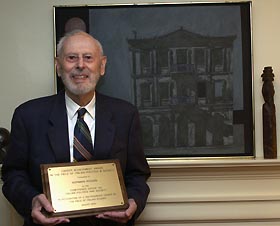|
This is an archived article.
For the latest news, go to the Advance Homepage
For more archives, go to the Advance Archive/Search Page. |
||
|
Expert On Italian Politics Honored
On Aug. 28 in the City of Brotherly Love, Kogan, professor emeritus of political science, was honored by peers at the annual meeting of the American Political Science Association, where he received the inaugural Career Achievement Award by the Conference Group on Italian Politics and Society.
Kogan, who retired in 1988, taught at UConn for nearly 40 years. "Professor Kogan was unanimously endorsed as our society's first recipient because of his outstanding scholarly achievements in the field of Italian study," said Filippo Sabetti, a professor at McGill University who is president of the Conference Group on Italian Politics and Society. "He was at the forefront of the study of politics in Europe." He added that it was on Kogan's initiative that the group was formed in the mid-1970s. "I felt there needed to be some way to collectively study Italian politics and we began with a small group," recalled Kogan, who was its first president in 1977. Today, the organization consists of a select group of 300 noted political scientists in the United States, Canada, and other countries. Its meetings dovetail with the American Political Science Association's annual conclave. For Kogan, the Italian connection began in 1943, when the Army accepted him into its foreign area and languages school after earning a bachelor of art's degree in political science from the University of Chicago. "When I finished my basic training at Fort Warren, Wyo., the Army sent me to language school," said Kogan. "They said 'name your first three choices'. I said 'Russian, French, and Italian' in that order. They put me in the Italian class. That's the Army." He's been grateful ever since. During the war, Kogan was assigned to the 331st Italian Quartermasters Battalion, which was stationed at an Army ordinance depot in Chambersburg, Pa. There were 1,000 collaboratives and 20 U.S. soldiers serving as supervisors. Kogan made his first trip to Italy in 1945 on a troop ship to escort the soldiers to Naples. "When we landed, we said goodbye and they were dispersed to their homes all over Italy," he said. Under different circumstances, Kogan returned to Italy five times as a University professor to study post-war Italian politics and Italian foreign policy, immersing himself in the Italian culture. He spent his days interviewing Italian politicians, academics, and prime ministers as a Fulbright Research Professor at the University of Rome, where he later served as a Fulbright Senior Lecturer. "I was introduced to Italian people who knew people, and that was an important part of my research," he said. He credits Gaetano Salvemini, then a Harvard University professor, with fostering his career and opening the door to some high-level connections. Salvemini taught Ferruccio Parri, for example, the first post-war Italian prime minister, whom Kogan would get to know. Kogan began his career in 1949 at the former Fort Trumbull branch in New London, the same year he earned a Ph.D. in international relations from the University of Chicago. "When I arrived at UConn, I taught in the former Department of Government and International Relations," said Kogan. "My special interest was Western Europe, particularly Italy, and that was the result of World War II and Italian events." His numerous books include Italy and the Allies, The Government of Italy, The Politics of Italian Foreign Policy, and A Political History of Postwar Italy. His special awards include a Knight, In the Order of Merit, presented to him in 1971 by the President of Italy, the late Giuseppe Saragat. The award is a Gold Star held by a green and red ribbon, the Italian colors. The modest professor, who now follows Italian politics in The New York Times, said he wouldn't be wearing the medal to Philadelphia. But there's also a tiny jewel lapel pin that is part of the award. Said Kogan: "I just might wear the pin." |
 f the U.S.
Army hadn't sent Norman Kogan off to the University
of Wisconsin during World War II to study Italian,
he wouldn't have brushed shoulders with three
Italian prime ministers or enjoyed an illustrious
career at UConn. Nor would he have taken the train
last month to Philadelphia.
f the U.S.
Army hadn't sent Norman Kogan off to the University
of Wisconsin during World War II to study Italian,
he wouldn't have brushed shoulders with three
Italian prime ministers or enjoyed an illustrious
career at UConn. Nor would he have taken the train
last month to Philadelphia.

